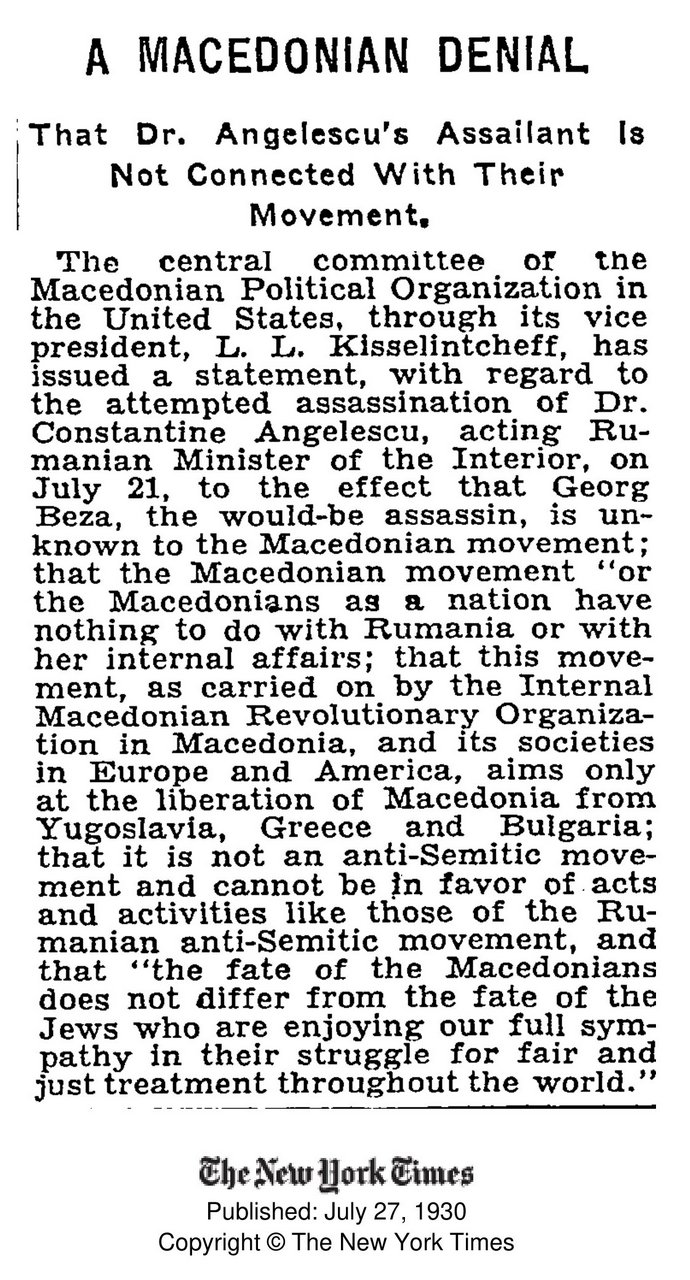Македонски
„МАКЕДОНСКО НЕГИРАЊЕ
…
Централниот комитет на Македонската Политичка Организација од Соединетите Држави, преку нивниот Заменик Претседател, Л. Л. Киселинчев, излезе со изјава која се однесува на обидот за атентат врз Др. Константин Ангелеску, тековен романски Министер за Внатрешни, во златец 21, за тоа дека Георг Беза, кој требало да биде атентатор е непознат за Македонското движење; дека Македонското движење ‘или Македонците како нација немаат никаква поврзаност со Романија или со нејзините внатрешни работи’; дека ова движење се заснова на Внатрешната Македонска Револуционерна Организација во Македонија и нејзините заедници во Европа и Америка, и ЦЕЛИ САМО КОН ОСЛОБОДУВАЊЕ НА МАКЕДОНИЈА ОД ЈУГОСЛАВИЈА, ГРЦИЈА И БУГАРИЈА; дека не е против-Семитско движење и не може да биде во поддршка на такви чинови и дејства како оние од романското против-Семитско движење и дека ‘вербата на Македонците не се разликува од вербата на Евреите кои уживаат наша целосна наклонетост во нивната борба за чесен и праведен однос низ светот.’“
English
A MACEDONIAN DENIAL
That Dr. Angelescu’s Assailant Is Not Connected With Their Movement,
The central committee or the Macedonian Political Organization in the United States, through its vice president, L. L. Kisselintcheff, has issued a statement, with regard to the attempted assassination of Dr. Constantine Angelescu, acting Rumanian Minister of the Interior, on July 21, to the effect that Georg Beza, the would-be assassin, is unknown to the Macedonian movement; that the Macedonian movement “or the Macedonians as a nation have nothing to do with Rumania or with her internal affairs; that this movement, as carried on by the Internal Macedonian Revolutionary Organization in Macedonia, and its societies in Europe and America, aims only at the liberation of Macedonia from Yugoslavia, Greece and Bulgaria; that it is not an anti-Semitic movement and cannot be in favor of acts and activities like those of the Rumanian anti-Semitic movement, and that “the fate of the Macedonians does not differ from the fate of the Jews who are enjoying our full sympathy in their struggle for fair and just treatment throughout the world.”
Published: July 27, 1930 Copyright © The New York Times
Посочил: Ѕале

